2nd graders are starting to read full sentences and working up to paragraphs. It's important that over the course of these worksheets students begin to build up a bit of reading endurance. This will serve them well as they start to work towards full on reading of bodies of work. These reading comprehension worksheets contain reading assignments and sets of questions for your second grade students. Question sheets may include such activities as short answer, placing events in the correct order, multiple choice, matching terms with the correct picture, matching opposites, group activities, and more. There are multiple question sheets for each reading passage, so be sure to print them all. In this particular section the answer keys are a little more clear cut than other sections.
Printable Reading Worksheets for 2nd Graders Worksheets
Click the buttons to print each worksheet and answer key.

Max's Best Friend
Max sat by the window looking at the street. Soon his best friend would be home. It would be the most fun time of the day. Then the school bus came and Alexander got off the bus, came up the walk and into the house.

Questions on Max
This is a series of questions that goes with the previous reading worksheet passage. When Alexander came home, what did he do first?

Story Sequences
Put the story in the right order. This is all based on the reaading passage about Max.

Baby Chicks
Mother Hen was sitting on her nest of straw in the chicken house at Brooks Acres Farm. Under her warm feathers were five eggs. Mother Hen had laid these eggs about 21 days ago so the baby chicks inside the eggs were ready to hatch.



Summer Treats
Jessica and Ellen were having fun on the swings at the park on a hot summer day. They both loved the feeling of the air on their faces when they would swing high up over the ground. After a little while they dragged their sneakers in the dirt to stop swinging.

Summer Treats Multiple Choice Questions
After playing on the swings where did the twins go? You will answer questions like this.


The Elephant and the Sunbird Worksheet
Gajbaahu the mighty elephant was walking through the jungle in India. He is a different species than the elephants of Africa and he was proud to be an Indian elephant.



Charleston's Kitten
Charleston wanted to have a pet of his very own. He thought and thought to decide what kind of pet he would like. Fish are colorful but he couldn't hold a fish.

Bedtime for Benji
Benji decided to watch the stars and the moon. Then he began to hear strange noises.
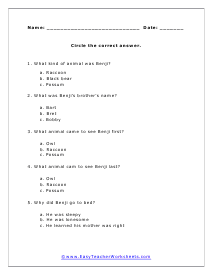
Bedtime for Benji Multiple Choice
What animal came to see Benji first? What animal cam to see Benji last?
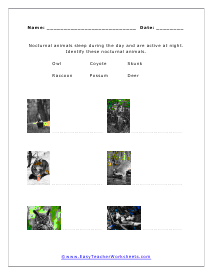
Nocturnal Animals
Nocturnal animals sleep during the day and are active at night. Identify these nocturnal animals.

A Birdhouse
Come Saturday morning Britney and Matthew arrived at the park recreation building wondering how they would build a birdhouse. They had never built anything before.

Birdhouse Questions
Where did the kids go to make a birdhouse? Where was the entrance hole of the birdhouse?
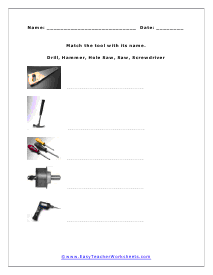

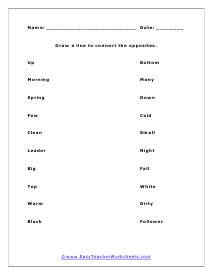
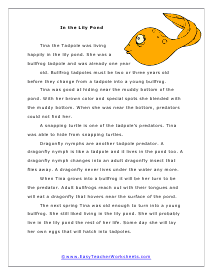
In the Lily Pond
Tina the Tadpole was living happily in the lily pond. She was a bullfrog tadpole and was already one year old. Bullfrog tadpoles must be two or three years old before they change from a tadpole into a young bullfrog. Tina was good at hiding near the muddy bottom of the pond.
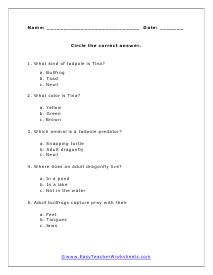
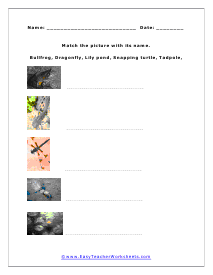

Harvey's Day Worksheet
Harvey was wide awake with the first light of the sun over the water. In fact, Harvey Penguin gets to stay up as late as he wants at night.

Penguin Questions
This goes with the reading passage. Harvey Penguin lives in the water near which continent?
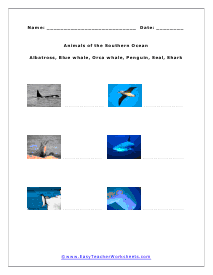
Animals of the Southern Ocean
Match the pictures to names: Albatross, Blue whale, Orca whale, Penguin, Seal, Shark
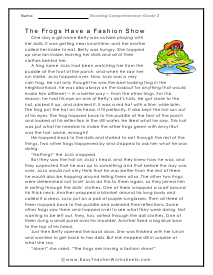
The Frogs Have a Fashion Show
One day a girl name Betty was outside playing with her dolls. It was getting near lunchtime, and her mother called her inside to eat. Betty was hungry.
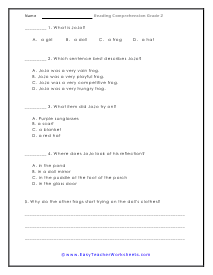
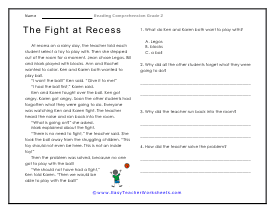
The Fight at Recess Reading Practice
Why did all the other students forget what they were going to do?

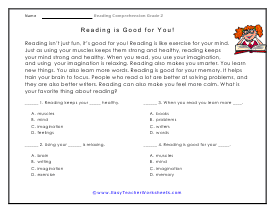
Reading is Good for You!
Reading can also make you feel more calm. What is your favorite thing about reading?

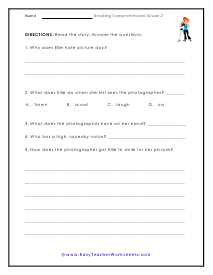

George Gets Lost
Once there was a lady who lived alone with her cat, George. She loved George very much. She lived in the city, and in the evenings George would sit outside with her on the fire escape while she read with a flashlight and listened to the night sounds.
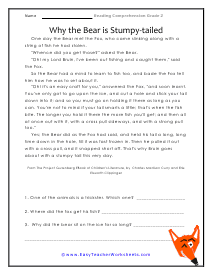
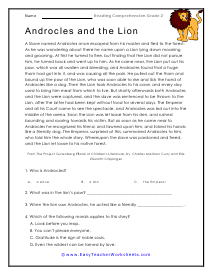
Androcles and the Lion
A story with a moral attached to it. Read the passage and then answer the series of questions at the bottom.
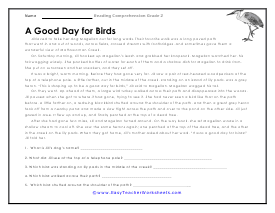
A Good Day for Birds
After she had gone two miles, Jill and Magellan turned around. On the way back, she let Magellan wade in a shallow stream to cool off. A solid reading passage and four follow up questions.
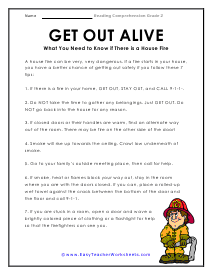
Get Out Alive
This is a reading that is setup in a listicle format. This is great for 2nd graders to see how they take in the reading using a different format.

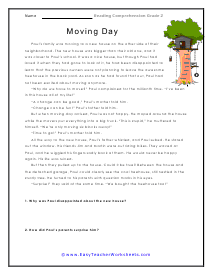
Moving Day
Why was Paul disappointed about the new house? This is a slightly longer reading passage and it finishes off with 2 questions.
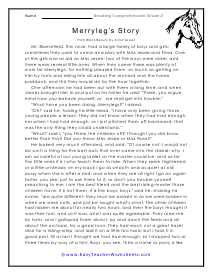
Merryleg's Story
A reading to work through with a deep thought process. This is a thicker reading passage.
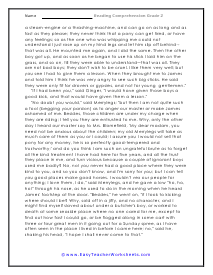
Merryleg's Story Page 2
This is a followup to the last reading passage. Thinking this is a clear and concise passage might be naive.
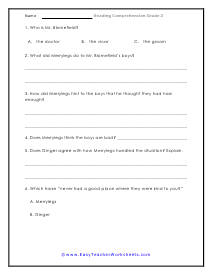
Merryleg's Story Question Worksheet
How did Merrylegs hint to the boys that he thought they had enough?
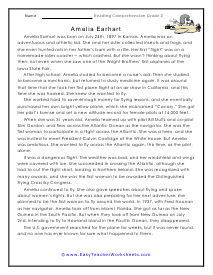
Amelia Earhart
Amelia was an adventurous and athletic kid. She and her sister collected insects and frogs, and she even hunted rats in her father's barn with a rifle.
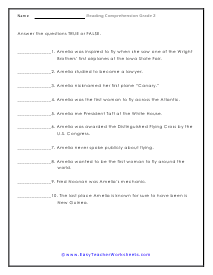
Amelia TRUE or FALSE
Amelia was inspired to fly when she saw one of the Wright Brothers’ first airplanes at the Iowa State Fair.

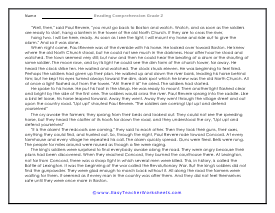
Midnight Ride Page 2
This goes with the previous page. Students will practice reading pictographs. Three problems are provided.


The Bull was Right
Once there was a boy who was always reading a book. He lived on a farm with his three brothers, but he did not play in the barn, or go fishing, or help out with the animals like his brothers did.

The Bull was Right Questions
Which of the three animals says that the book must be special if the boy has it with him all the time?
Strategies for Helping 2nd Grade Readers
At the 2nd grade level students begin to expand their vocabulary and grow to learning complex words and have the innate ability to focus on larger words. They can also absorb higher levels of information at a much more rapid rate. Students begin to expand their knowledge of genres beyond fiction and nonfiction. The focus shifts a bit to a slower and steadier pace with poetry. This is often where students can start to hold discussion about what they have read and where it sits in their mindset. This is the grade level where I will allow a group of mature students to begin the process of peer review and editing. This is where teachers can begin to encourage students to read for purpose. It is also where students begin to thrive on the concept of reading for purpose.
Reading is a wonderful pastime, but it also enables one to gain an extensive degree of knowledge and use their imagination in ways that stimulate creativity within them. You can pick up reading as a habit at any point in your life, but starting early always helps. Read this blog to discover how you can help 2nd-grade students become better readers.
Read to Them
Reading to your 2nd grader can help you bond with them. If you’re looking for ways to spend time with your child in a productive manner, reading is a great option. Children are quick learners; they implement behavior their parents model for them at home and teachers display at school. When you read to your child, make it feel more exciting and interesting to incite curiosity within the child and motivate them to try reading for themselves.
Talk to Your Child
The easiest way to feed vocabulary to a 2nd grader is to talk to them. When you speak to a 2nd-grade reader like they’re an adult, you expose them to refined language and help them build their language skills. Your child will enjoy reading only if they understand what the words mean, and if you utilize big, interesting words in conversations with your child, they won’t feel confused when they read it in a storybook. Using descriptive words makes speech more exciting by attaching feelings to words. For instance, when speaking to your child, describe actions like ‘yawning’ or ‘snoring.’ Pro tip: use body language to help them understand better, and explain the meanings of words they seem confused about.
Encourage Them to Tell You Stories
The best way to introduce your 2nd grader to literacy is by helping them practice dictation. Listen to their stories and encourage them to use bigger words. If you use rich language to communicate with your child, they’ll try to speak to you using similar vocabulary. The story can be about how their day went or a completely fictional story that you can write down and read to them later. This can be a fun, bonding experiment that you and the child will enjoy. When children tell you stories, not only do they feel closer to you, but their language skills also improve. Plus, when you read to them and listen to their stories, you create curiosity within them to read and listen to more stories.
Teach Your Child How to Read Using Sounds
Children find it easier to read as their phonemic awareness grows, which means when they can sound words and spell them. The sound of the alphabet helps children write and read better by making it easier for them to pronounce and understand the meaning of words. For instance, instead of spelling C-A-T, teach your child how to connect alphabets to their sound, like C for CA and A for AA, and T for TA. Children enjoy challenges but find overly complex tasks distressing. By making reading easier for them, you help them generate a likeness for it.
Use Picture Books
Even the most disinterested 2nd grade readers enjoy reading picture books. You can encourage your child to read by attaching words with images. This helps stimulate their imagination and teaches them to create images in their minds to go with the stories they read, even if the book they’re reading doesn't have pictures. Every reader imagines the appearance of characters and what their surroundings look like; that's what makes reading fun. Once your child connects reading with the use of imagination, they’ll find reading far more interesting and make a greater effort to learn.

